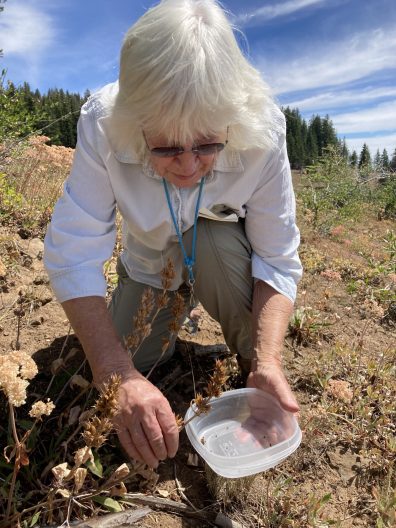Notes from the Field

Rare Care volunteers are known for going on some pretty extreme adventures each year to search for rare plants, and the 2023 monitoring season was no exception. From paddling down rivers to trekking up mountains and cliffsides, it doesn’t seem like there’s much that can stop our volunteers, except maybe the occasional rattlesnake encounter!
Volunteers Carol Mack, John Stuart and two friends took their canoes 10 miles up the Pend Oreille River to search the shoreline for lesser-bladder milk vetch (Astragalus microcystis). Four sets of eyes found several hundred plants scattered over slate slopes along an approximate mile stretch of riverbank. The area the group searched is one of two disjunct population areas where lesser-bladder milk vetch is found in Washington: the other is found on the Olympic Peninsula.
At 7,500 feet, Laura Potash and fellow volunteer Cyndy Smith-Kuebel, found a rare variety of Ross’s avens (Geum rossii var. depressum) on the slopes of Mount Stuart. They spent three days on the mountain and accomplished some difficult 4th class scrambling to reach the plants, with helmets on, of course! Near Leavenworth, extensive surveying for strawberry saxifrage (Saxifragopsis fragarioides) was halted when Kayla Seaforth and Kristin Bird ran into a rattlesnake at the rock outcropping where the plants were found. Kayla and Kristin counted 82 plants before leaving the saxifrage habitat, and the rattlesnake, behind them. Further east near Odessa, another rattlesnake encounter prevented Bob Kent from fully surveying the riparian habitat where he found Washington Jacob’s ladder (Polemonium pectinatum).
Sometimes a monitoring trip is less perilous, but with impressive results, nonetheless. Just off a forest road about an hour west of Yakima, Ronald Toonen found and mapped the largest extent of Sierra onion (Allium campanulatum) on record. The prairie habitat Toonen visited is one of only three recorded locations for of Sierra onion in Washington.
On the winding roads through Umatilla National Forest, volunteers Darcy Dauble and Sue Wickham led Rare Care staff to several populations of Blue Mountains beardtongue (Penstemon pennellianus) and collected an estimated 2,000 seeds for the Miller Seed Vault. Although an easy drive from Walla Walla, it takes an accomplished explorer to navigate the numerous dirt roads of the Blue Mountains! Thanks to Darcy and Sue for being incredible navigators and thank you to all of our volunteers for another great season of adventures.